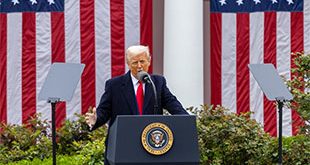
Geneva, Switzerland | AFP | The Red Cross and the UN urged countries Wednesday to avoid trying to secure future immunisation jabs against the coronavirus for their populations only, calling for a true “people’s vaccine”.
The groups spoke out as scientists race to identify and test possible vaccines for COVID-19, which has killed more than 380,000 people and infected close to 6.5 million globally.
They are also scrambling to find a safe and effective treatment.
“We need to fight what is now called vaccine nationalism,” Emanuel Capobianco, head of health at the International Federation of Red Cross and Red Crescent Societies (IFRC), told AFP.
Unless there was a clear international commitment to global solidarity on this issue, individual countries might end up scrambling to secure their own populations’ vaccine needs.
But while the world waited for that vaccine, countries would do well to invest in getting production and distribution up to scale — for everyone, everywhere, he advised.
“Now is the moment to prioritise that,” said Capobianco.
“We need to make sure that this spirit of global solidarity and this principle of vaccines as a public good is put at the very centre of the political agenda on COVID-19.”
Capobianco spoke as the United Nations and the International Red Cross and Red Crescent Movement, which IFRC is part of, issued a joint appeal for the global community to ensure fair access once a vaccine was found.
“The spirit of global solidarity must prevail: no one should be left behind,” they said.
“A global social contract for a people’s vaccine against COVID-19 is a moral imperative that brings us all together in our shared humanity.”
– The disease ‘discriminates’ –
World Health Organization member states also agreed last month that extensive immunisation against the new coronavirus would be a “global public good”. Any vaccine, that did emerge should be fairly distributed to all, they said.
But there has been pushback not just from pharmaceutical companies but from Washington, which opposes any challenge to international intellectual property rights.
While Capobianco acknowledged the differences, he insisted that it would be in everyone’s interest ensure everyone is protected — because the disease itself “clearly discriminates”.
In many countries, it had had a disproportionate impact on minorities and other disadvantaged groups, he argued. These were the people more likely to live in poverty, face discrimination and struggle to get health care.
“It is something that concerns us tremendously,” said Capobianco. “It is a disease that affects mostly the poor, the most vulnerable.”
He cautioned too, against those who thought that the pandemic might simply run its course. Until there was a vaccine and treatment, he said, the danger was ever-present.
“This virus is around, this virus has the potential to infect many more millions of people and to kill many more hundreds of thousands of people,” he said.
“We are still in the middle of it. We can’t lower the guard.”
 The Independent Uganda: You get the Truth we Pay the Price
The Independent Uganda: You get the Truth we Pay the Price



